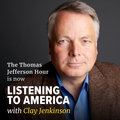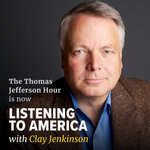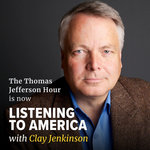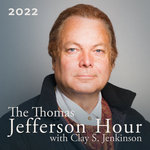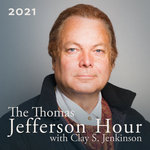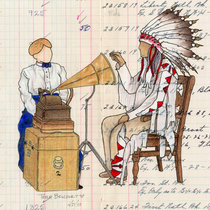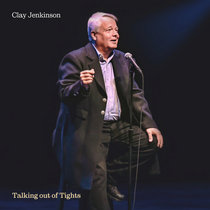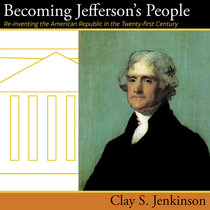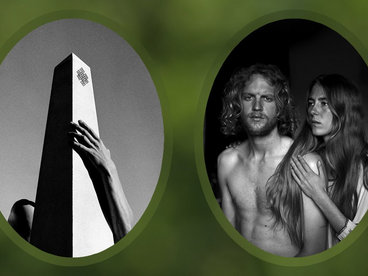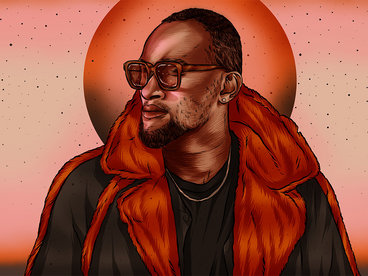
Honoring John McCain
from What Would Thomas Jefferson Do? (2018) by Listening to America with Clay Jenkinson
1776 Club exclusive
-
1776 Club
Join now to receive all the new shows Listening to America with Clay Jenkinson creates, including 19 back-catalog releases, delivered instantly to you via the Bandcamp app for iOS and Android. You’ll also get access to supporter-only exclusives like this track. Learn more.Join Now $5 USD/month or more
about
DS: 00:00 Good day citizens and welcome to What Would Jefferson Do?, our weekly opportunity to discuss current American events with President Thomas Jefferson, who is seated across from me now. Good day to you, Mr. President.
CSJ as TJ: 00:15 Good day to you, citizen.
DS: 00:16 Mr Jefferson, we've lost a giant in American politics: a senior senator, a man who ran for the presidency twice, a man who had a outspoken views. He had his supporters and his detractors, but as always, he put his country first. He was a war hero, and I'd like to ask you, Mr Jefferson, how should the nation honor a man such as this?
CSJ as TJ: 00:40 Theoretically, his memory will live on if he has done good things for his state and for the country, and maybe that's the only immortality we get. There may be buildings named after such a person, or ships, or other ways of commemorating his legacy. In my time, we only had one real hero and that was George Washington: first in war, first in peace, first in the hearts of his countrymen, as one of my fellow Virginians said of him. But we were pretty concerned in my era about creating a sort of pantheon of gods and demigods. In a Republic, that's dangerous because theoretically we're all equal, and citizens come out of their private life to serve in public functions for a short time. And then they return with alacrity to their more private pursuit of happiness. So it's a little problematic to aggrandize any single individual too much. It makes it seem as if our system might depend upon that person's greatness. I know we all felt this about Washington. We knew that he was indispensable, that he must be the first president of the United States. In fact, we insisted that he served two terms, but in doing so, of course, we were in many ways questioning our capacity to go on without him. That's very dangerous in a free society. I believe government is a few plain duties performed by a few honest men. I always had greater respect for veterans than for non-veterans because, of course, they put their lives on the line for the rest of us. And when I was president, if I was choosing between appointing person A and person B, all other things being equal, I always gave the appointment to the veteran as a show of gratitude from a country whose service they had undertaken, and at some sacrifice both to their private lives and to their capacity to get along in the world. And so I think that it's fair that the people themselves will decide and historians will decide. People that make a big splash in their lifetime may wind up being footnotes to history, and people that are not very well regarded in their lifetime — men like James Madison — turn out to be some of the great giants in historical memory.
DS: 03:06 This gentleman, Senator John McCain of Arizona — I think, to me, his greatest legacy was his ability to always put the nation first and to put partisanship as a problem that he could surmount.
CSJ as TJ: 03:22 As you know, in a letter to Edward Carrington of 1787, I said, I've never put the whole body of my opinions — in politics or religion or anything else where I was free to think — into any party of men whatsoever. Such an addiction is the last degradation of a free and virtuous spirit. If I could only go to heaven at the head of the party, I would rather not go at all — so what I look for in any statesman, any politician, really, is a commitment to the commonwealth — to the larger interests of the United States — that may sometimes resonate with the party's platform or in a party outlook. At other times, it may deviate even severely from the home party's views, but a statesman is one who always asks what is best for this country, and that person then attempts to vote his conscience, and breaks perhaps with his own party if he feels that it's necessary, and crosses the aisle, as you like to put it, to find common cause with others. That is essentially the definition of a statesman.
DS: 04:29 Mr Jefferson, at this time, flags are flying at half staff throughout the country in memory of Mr McCain. He asked that his eulogy be short and simple: that he was a man who served his country.
CSJ as TJ: 04:41 It's excellent, and I also noticed, with some joy and irony, that the two men he's asked to speak eulogies at his funeral are both people who defeated him for the presidency of the United States.
DS: 04:52 That does indeed show character, Mr Jefferson. I thank you sir.
CSJ as TJ: 04:56 You are most welcome sir.
CSJ as TJ: 00:15 Good day to you, citizen.
DS: 00:16 Mr Jefferson, we've lost a giant in American politics: a senior senator, a man who ran for the presidency twice, a man who had a outspoken views. He had his supporters and his detractors, but as always, he put his country first. He was a war hero, and I'd like to ask you, Mr Jefferson, how should the nation honor a man such as this?
CSJ as TJ: 00:40 Theoretically, his memory will live on if he has done good things for his state and for the country, and maybe that's the only immortality we get. There may be buildings named after such a person, or ships, or other ways of commemorating his legacy. In my time, we only had one real hero and that was George Washington: first in war, first in peace, first in the hearts of his countrymen, as one of my fellow Virginians said of him. But we were pretty concerned in my era about creating a sort of pantheon of gods and demigods. In a Republic, that's dangerous because theoretically we're all equal, and citizens come out of their private life to serve in public functions for a short time. And then they return with alacrity to their more private pursuit of happiness. So it's a little problematic to aggrandize any single individual too much. It makes it seem as if our system might depend upon that person's greatness. I know we all felt this about Washington. We knew that he was indispensable, that he must be the first president of the United States. In fact, we insisted that he served two terms, but in doing so, of course, we were in many ways questioning our capacity to go on without him. That's very dangerous in a free society. I believe government is a few plain duties performed by a few honest men. I always had greater respect for veterans than for non-veterans because, of course, they put their lives on the line for the rest of us. And when I was president, if I was choosing between appointing person A and person B, all other things being equal, I always gave the appointment to the veteran as a show of gratitude from a country whose service they had undertaken, and at some sacrifice both to their private lives and to their capacity to get along in the world. And so I think that it's fair that the people themselves will decide and historians will decide. People that make a big splash in their lifetime may wind up being footnotes to history, and people that are not very well regarded in their lifetime — men like James Madison — turn out to be some of the great giants in historical memory.
DS: 03:06 This gentleman, Senator John McCain of Arizona — I think, to me, his greatest legacy was his ability to always put the nation first and to put partisanship as a problem that he could surmount.
CSJ as TJ: 03:22 As you know, in a letter to Edward Carrington of 1787, I said, I've never put the whole body of my opinions — in politics or religion or anything else where I was free to think — into any party of men whatsoever. Such an addiction is the last degradation of a free and virtuous spirit. If I could only go to heaven at the head of the party, I would rather not go at all — so what I look for in any statesman, any politician, really, is a commitment to the commonwealth — to the larger interests of the United States — that may sometimes resonate with the party's platform or in a party outlook. At other times, it may deviate even severely from the home party's views, but a statesman is one who always asks what is best for this country, and that person then attempts to vote his conscience, and breaks perhaps with his own party if he feels that it's necessary, and crosses the aisle, as you like to put it, to find common cause with others. That is essentially the definition of a statesman.
DS: 04:29 Mr Jefferson, at this time, flags are flying at half staff throughout the country in memory of Mr McCain. He asked that his eulogy be short and simple: that he was a man who served his country.
CSJ as TJ: 04:41 It's excellent, and I also noticed, with some joy and irony, that the two men he's asked to speak eulogies at his funeral are both people who defeated him for the presidency of the United States.
DS: 04:52 That does indeed show character, Mr Jefferson. I thank you sir.
CSJ as TJ: 04:56 You are most welcome sir.
lyrics
"A statesman is one who always asks what is best for this country."
— Clay S. Jenkinson portraying Thomas Jefferson
— Clay S. Jenkinson portraying Thomas Jefferson
credits
from What Would Thomas Jefferson Do? (2018),
track released September 4, 2018
jeffersonhour.com/blog/1302wwtjd
jeffersonhour.com/blog/1302wwtjd
license
all rights reserved
tags
about
Listening to America with Clay Jenkinson
The Thomas Jefferson Hour is a weekly radio program dedicated to the search for truth in the tradition of Thomas
Jefferson.
Nationally acclaimed humanities scholar and award-winning first-person interpreter of Thomas Jefferson, Clay S. Jenkinson, portrays Jefferson on the program, and he answers listener questions while in the persona of our third president.
... more
contact / help
Listening to America with Clay Jenkinson recommends:
If you like Listening to America with Clay Jenkinson, you may also like:

